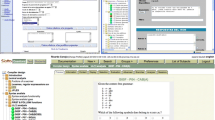Abstract
In an attempt to support traditional classroom assessment processes with fully computerized methods, we have developed a method for adaptive assessment suitable for well structured domains with high emphasis on problem solving and capable of robust continuous assessment, potentially encouraging student’s achievements, reflective thinking, and creativity. The method selects problems according to the student’s demonstrated ability, structured task description schemes allow for a detailed analysis of student’s errors, and on-demand generation of task instances facilitates independent student work. We evaluated the proposed method using a software system we had developed in the domain of middle school mathematics.
Preview
Unable to display preview. Download preview PDF.
Similar content being viewed by others
References
Brusilovsky, P., Miller, P.: Web-based testing for distance education. In: De Bra, P., Leggett, J. (eds.) Proceedings of WebNet 1999, pp. 149–154. AACE (1999)
Mills, C., Steffen, M.: The GRE Computer Adaptive Test: Operational Issues. Computerized Adaptive Testing: Theory and Practice (2000)
Aleven, V., McLaren, B., Sewall, J., Koedinger, K.: The Cognitive Tutor Authoring Tools (CTAT): Preliminary evaluation of efficiency gains. In: Ikeda, M., Ashley, K.D., Chan, T.-W. (eds.) ITS 2006. LNCS, vol. 4053, pp. 61–70. Springer, Heidelberg (2006)
Feng, M., Heffernan, N., Koedinger, K.: Addressing the Testing Challenge with a Web-based E-Assessment System that Tutors as it Assesses. In: Proceedings of the 15th international conference on World Wide Web, pp. 307–316 (2006)
Lord, F., Novick, M.: Statistical theories of mental test scores. Addison-Wesley, Reading (1968)
Wainer, H.: Computerized Adaptive Testing: A Primer. Lawrence Erlbaum Associates, Mahwah (2000)
Black, P., Wiliam, D.: Inside the Black Box: Raising Standards Through Classroom Assessment. Phi Delta Kappan 80(2), 139–148 (1998)
Conejo, R.: SIETTE: A Web-Based Tool for Adaptive Testing. International Journal of Artificial Intelligence in Education 14(1), 29–61 (2004)
Conejo, R., Guzmán, E., Pérez-de-la Cruz, J.L., Millán, E.: An Empirical Study About Calibration of Adaptive Hints in Web-Based Adaptive Testing Environments. In: Adaptive Hypermedia and Adaptive Web-Based Systems, pp. 71–80 (2006)
Irvine, S., Kyllonen, P.: Item Generation for Test Development. Lawrence Erlbaum Associates, Mahwah (2002)
Bejar, I., Lawless, R., Morley, M., Wagner, M., Bennett, R., Revuelta, J.: A Feasibility Study of On-the-Fly Item Generation in Adaptive Testing. Journal of Technology, Learning, and Assessment 2(3) (2003)
Sinharay, S., Johnson, M.: Analysis of Data From an Admissions Test With Item Models. Educational Testing Service (2005)
Deane, P., Sheehan, K.: Automatic Item Generation via Frame Semantics: Natural Language Generation of Math Word Problems. In: Annual meeting of the National Council on Measurement in Education, Chicago, IL (2003)
Chang, H., Qian, J., Ying, Z.: a-Stratified Multistage Computerized Adaptive Testing with b-Blocking. Applied Psych. Measurement 25(4), 333–341 (2001)
Birnbaum, A.: Efficient design and use of tests of a mental ability for various decision-making problems. In: Randolph Air Force Base. Air University, School of Aviation Medicine, Texas (1957)
Baker, F., Seock-Ho, K.: Item Response Theory: Parameter Estimation Techniques. CRC Press, Boca Raton (2004)
Author information
Authors and Affiliations
Editor information
Rights and permissions
Copyright information
© 2008 Springer-Verlag Berlin Heidelberg
About this paper
Cite this paper
Tvarožek, J., Kravčík, M., Bieliková, M. (2008). Towards Computerized Adaptive Assessment Based on Structured Tasks. In: Nejdl, W., Kay, J., Pu, P., Herder, E. (eds) Adaptive Hypermedia and Adaptive Web-Based Systems. AH 2008. Lecture Notes in Computer Science, vol 5149. Springer, Berlin, Heidelberg. https://doi.org/10.1007/978-3-540-70987-9_25
Download citation
DOI: https://doi.org/10.1007/978-3-540-70987-9_25
Publisher Name: Springer, Berlin, Heidelberg
Print ISBN: 978-3-540-70984-8
Online ISBN: 978-3-540-70987-9
eBook Packages: Computer ScienceComputer Science (R0)




